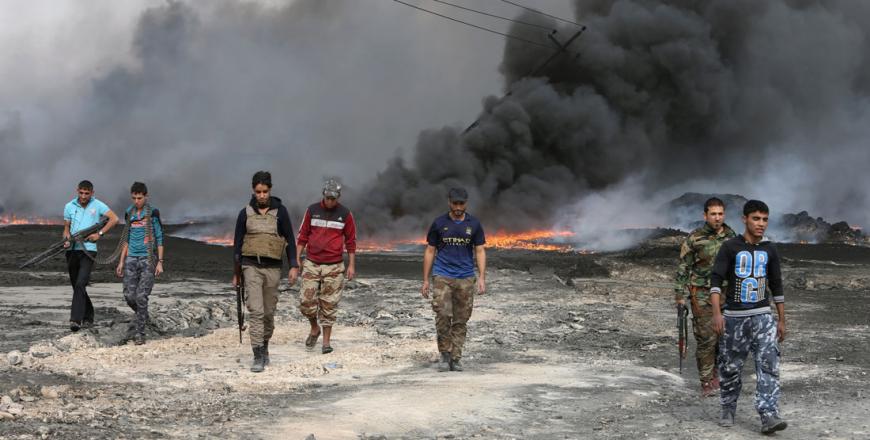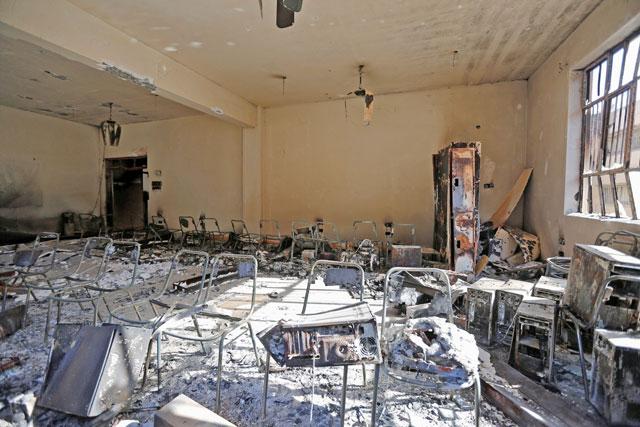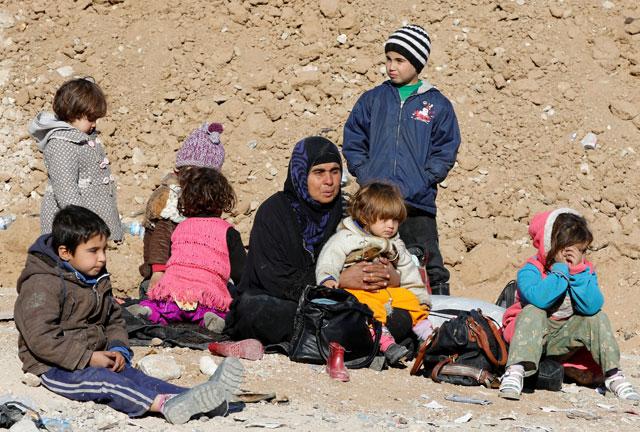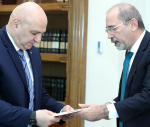You are here
Iraqi general says 70 per cent of east Mosul retaken from Daesh
By Reuters - Jan 05,2017 - Last updated at Jan 05,2017
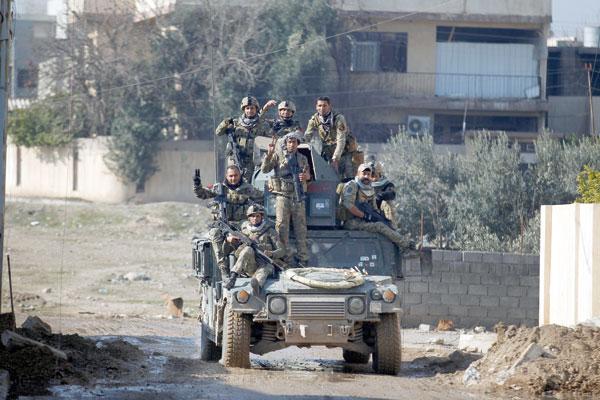
Members of the Iraqi rapid response forces ride a military vehicle during a battle with Daesh militants in the Mithaq district of eastern Mosul, Iraq, Thursday (Reuters photo)
ERBIL, Iraq — Iraqi forces have retaken around 70 per cent of eastern Mosul from the Daesh terror groupmilitants and expect to reach the river bisecting the city in the coming days, Iraq’s joint operations commander told Reuters.
Lieutenant General Talib Shaghati, who is also head of the elite counter-terrorism service (CTS) spearheading the campaign to retake the northern city, said the cooperation of residents was helping them advance against Daesh.
In its 12th week, the offensive has gained momentum since Iraqi forces backed by a US-led coalition renewed their push for the city a week ago, clearing several more eastern districts despite fierce resistance.
“Roughly 65-70 per cent of the eastern side has been liberated,” Shaghati said in an interview late on Wednesday in the Kurdish capital of Erbil. “I think in the coming few days we will see the full liberation of the eastern side.”
The western half of the city remains under the full control of Daesh, which is fighting to hold on to its largest urban stronghold with snipers and suicide car bombs numbering “in the hundreds” according to Shaghati.
The Mosul assault, involving a 100,000-strong ground force of Iraqi government troops, members of the autonomous Kurdish security forces and mainly Shiite militiamen, is the most complex battle in Iraq since the US-led invasion in 2003.
The commander of a US-led coalition backing the Iraqi offensive told Reuters on Wednesday that increased momentum was due largely to better coordination among the army and security forces. He said the Iraqis had improved their ability to defend against Daesh car bombs.
Although vastly outnumbered, the militants have used the urban terrain to their advantage, concealing car bombs in narrow alleys, posting snipers on tall buildings with civilians on lower floors and making tunnels and surface-level passageways between buildings. They have also embedded themselves among the local population.
Human shields
The presence of large numbers of civilians on the battlefield has restricted Iraqi forces’ use of artillery but the cooperation of residents has also helped them target the militants.
“They give us information about the location of the terrorists, their movements and weapons that has helped us pursue them and arrest some and kill others,” Shaghati said.
In the run-up to the Mosul offensive, Iraqi officials expressed hope that residents would rise up against Daesh, accelerating the group’s demise in the city. But mass executions seem to have discouraged widespread resistance.
An Iraqi victory in Mosul would probably spell the end for Daesh’s self-styled “caliphate”, which leader Abu Bakr Al Baghdadi declared two-and-a-half years ago from Mosul’s main mosque after the militants overran the city.
But in recent days, the militants have displayed the tactics to which they are likely to resort if they lose the city, killing dozens with bombs in Baghdad and attacking security forces elsewhere.
An attack claimed by Daesh killed six people on Thursday on the capital’s eastern outskirts.
CTS pushed into Mosul from the east in late October and made swift advances but regular army troops tasked with advancing from the north and south made slower progress and the operation stalled for several weeks.
The roughly 10,000 members of CTS, established a decade ago with support from the US forces, are considered the best-trained and equipped fighters in Iraq.
Shaghati described the role of the international coalition, providing air support and advising Iraqi forces on the ground as “outstanding” and said Daesh was crumbling under pressure.
“Daesh devised many plans to obstruct and block us but they failed. We were able to surpass them and these areas were liberated with high speed,” Shaghati said.
“We have intelligence that [Daesh] leaders and their families are fleeing outside Iraq.”
Related Articles
EAST OF MOSUL, Iraq — Iraqi forces battled Daesh militants on the eastern edge of Mosul on Tuesday as the two-week campaign to recapture the
ERBIL — Iraqi forces on Saturday retook Mosul's university from the Daesh terror group, the latest key advance in efforts to recapture the e
BAGHDAD/ERBIL — Iraqi forces joined flanks in northern Mosul and drove back Daesh militants in the southeast on Thursday in a renewed push t


